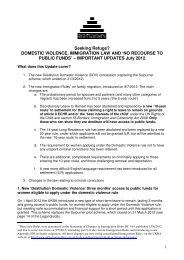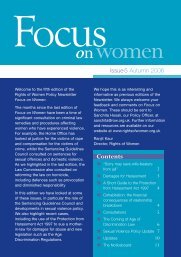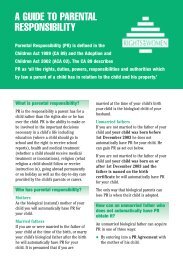Seeking Refuge? - Rights of Women
Seeking Refuge? - Rights of Women
Seeking Refuge? - Rights of Women
Create successful ePaper yourself
Turn your PDF publications into a flip-book with our unique Google optimized e-Paper software.
in support <strong>of</strong> your claim need to be translated,<br />
and it appears that this will take longer than<br />
the time allowed under the detained fast-track.<br />
If you are detained, you will be taken to Yarls<br />
Wood, an Immigration Removal Centre which<br />
deals with women whose claims are decided in<br />
the detained fast-track.<br />
Your rights in detention<br />
<strong>Women</strong> in detention have certain rights, including<br />
the right to a medical examination and the right<br />
to legal advice.<br />
Medical examination<br />
The Detention Centre Rules 2001 15 set out how<br />
detention centres should be run.<br />
Under Rules 34 and 35, you should be given a<br />
medical examination within the first 48 hours <strong>of</strong><br />
your detention. This examination should be<br />
carried out by a doctor who will take notes <strong>of</strong><br />
what you say and any injuries he or she notices.<br />
It is important that you tell the doctor about:<br />
• any physical or mental health problems that<br />
you have;<br />
• any injuries that you have and how you got<br />
them;<br />
• whether you have been tortured (torture is<br />
when someone causes you serious physical<br />
harm);<br />
• if you have been raped or sexually assaulted<br />
(rape is also a type <strong>of</strong> torture); and<br />
• if you are pregnant, or think you might be<br />
pregnant.<br />
It is important to tell the doctor all <strong>of</strong> this<br />
because, under Rule 35 <strong>of</strong> the Detention Centre<br />
Rules 2001, healthcare workers at Immigration<br />
Removal Centres who believe that a woman has<br />
been tortured, or has a particular illness or<br />
condition, have to report this to the manager <strong>of</strong><br />
the Immigration Removal Centre. The report will<br />
then be given to the person who is responsible for<br />
your detention, and also to your case-owner. The<br />
report will be used to see whether you should be<br />
kept in detention or released, and could also be<br />
useful in your asylum claim. It can also be used to<br />
arrange for you to be referred to a specialist<br />
organisation which may be able to arrange<br />
medical treatment for you, or to provide you with<br />
a report for your case.<br />
Medical examinations and detention: the<br />
case <strong>of</strong> PB [2008]<br />
PB claimed asylum in the UK. She was from<br />
Cameroon and had been raped and tortured.<br />
PB was detained when she claimed asylum<br />
and her case was dealt with under the<br />
detained fast-track. Her asylum application<br />
and an appeal had been rejected. The Home<br />
Office then started proceedings to remove PB<br />
to Cameroon and legal steps were taken to try<br />
and prevent her removal.<br />
The Home Office then admitted that PB had<br />
not been given a medical examination when<br />
she had first been detained as required by the<br />
The Detention Centre Rules 2001. If the<br />
examination had been done when it should<br />
have been, PB would have had independent<br />
evidence that she had been tortured. The<br />
judge found that this report would have<br />
resulted in her release from detention, and<br />
would have been important evidence in her<br />
asylum claim. Consequently the judge found<br />
that PB’s detention had been against the law<br />
and gave her £38,000.<br />
If you are not given a medical examination your<br />
detention will be considered unlawful, following<br />
the case <strong>of</strong> PB [2008] 16 , and you should seek legal<br />
advice.<br />
How can I get legal advice?<br />
There are a number <strong>of</strong> legal representatives who<br />
work with women in detention. You will be given<br />
a legal representative to assist you with your case<br />
if you are eligible for public funding (otherwise<br />
known as legal aid).<br />
Your legal representative is the person who<br />
advises you on the law and your rights. Your<br />
legal representative may be a solicitor or an<br />
immigration advisor. A solicitor is a qualified<br />
lawyer who is responsible for dealing with the<br />
preparation <strong>of</strong> cases. Some solicitors may also<br />
represent their clients in courts or tribunals.<br />
Solicitors are represented by the Law Society<br />
www.lawsociety.org.uk and are regulated by the<br />
Solicitors Regulation Authority www.sra.org.uk<br />
An immigration advisor is someone who is not a<br />
solicitor, but who is able to give immigration law<br />
advice. For information about immigration<br />
advisors, contact the Office <strong>of</strong> the Immigration<br />
Services Commissioner www.oisc.gov.uk<br />
28
















